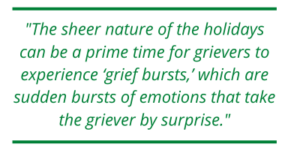
7 Caring Strategies to Support a Grieving Employee Over the Holidays
With an empathetic leadership strategy, you’ll know exactly what to say and do to show a grieving employee you care, drive down presenteeism, and preserve productivity and team morale.
The holidays can bring up a range of complicated emotions for employees suffering from challenging life disruptions that cause grief, like the death of a loved one, a complex caregiving situation, a disease diagnosis, or divorce.
It’s not easy to adjust to a new normal and a changing family dynamic, especially during a season of the year steeped in festivities, traditions and expectations.
For a grieving or caregiving employee, the revelry of the holidays can amplify a sense of loss and isolation.
Signs that your employee is struggling during the holiday season include:
- A sudden drop in productivity.
- Disengagement or presenteeism (when an employee is physically present but emotionally disengaged).
- Unusually forgetful or distracted.
- Working more than usual.
- Frequently out sick.
Read more about what to expect from a grieving employee in our article Your Employee’s Brain on Grief.
Lead with empathy.
With a few simple leadership strategies, you can show you care while also effectively re-engaging a grieving employee and strengthening your team.
1. Check-in.
Touch base with employees who are caring for aging or sick loved ones, experiencing an emotional life transition, or grieving the death of a loved one.
Acknowledge that the holiday season might be difficult. Ask them if there’s anything that you can do to help. Do they need to take a day off? Can another team member temporarily take over some tasks?
People grieve differently and not everyone will talk about the grief they may be feeling during the holidays. If you aren’t sure if someone on your team is grieving, a team check-in can also be beneficial.
2. Listen.
Grievers find comfort in sharing stories about their loved ones. When we take time to listen, we actively support their recovery and help them feel less alone.
Don’t try to “fix” their pain by saying things like “it will be okay” or by telling them how they should feel. Simply being with someone in their pain is supportive.
Need help navigating the conversation? Here are four Grief Conversation Rules of Thumb to keep in mind.
- It’s not about you. While it might seem to make sense to share your own experiences with grief as a way of relating to the other person, only do so if asked. Offering your full attention to listen is most helpful.
- There is no bright side. Avoid saying anything that starts with “at least.” A statement like “at least they are no longer in pain” is dismissive and does nothing to alleviate the sadness a griever is feeling.
- Be thoughtful about religion. Avoid sharing religious or spiritual beliefs if you’re unsure about the griever’s faith or belief systems.
- Let them feel. Grief can manifest in a range of emotions. An employee might feel moodier when holidays or anniversaries are approaching. Avoid telling them how they should feel or that they shouldn’t cry or feel angry. Do let them know that you are there for them if they would like to talk about it.
3. Be inclusive, but flexible.
If your company usually hosts an annual holiday party, personally extend the invitation to a grieving employee without pressuring them to attend. Grief is unpredictable.
Realize that a “yes, I’d love to join you” might change to a “no, I can’t do it” on the day of the event, or they may choose to only make a brief appearance. Don’t take an absence or early departure personally.
Reassure your grieving employee that they need to do what works best for them. Their capacity to attend is a personal decision and not a reflection of their dedication to the organization.
4. Understand “grief bursts.”
 The sheer nature of the holidays can be a prime time for grievers to experience “grief bursts,” which are sudden bursts of emotions that take the griever by surprise. Triggers can be anything from seasonal smells and songs to seeing someone in a crowd who resembles their loved one.
The sheer nature of the holidays can be a prime time for grievers to experience “grief bursts,” which are sudden bursts of emotions that take the griever by surprise. Triggers can be anything from seasonal smells and songs to seeing someone in a crowd who resembles their loved one.
If your employee is particularly overwhelmed by intense emotions, take time to listen and encourage gentle self-care, like stepping outside for some fresh air or a walk, offering a quiet space in the company where they can retreat for a little while, or allowing them to leave early from work to rest.
5. Take thoughtful action.
The holidays are a nostalgic time for many. Understand that piping holiday music through the office can be especially distressing for a grieving employee.
Small, meaningful gestures go a long way toward helping an employee feel supported at work. Leave a card on your employee’s desk to let them know you’re thinking about them or have flowers delivered from the team to your employee’s home. You might write, “We’re thinking about you during this holiday season.”
6. Organize a team tribute.
For many people, the holidays underscore the spirit of giving, and they seek ways to make the holidays easier or a little more special for someone who is struggling.
Gather your team and participate in a charitable endeavor or special cause fundraiser that thoughtfully honors a grieving or caregiving employee’s loved one and benefits the community.
This is also a great way to acknowledge an employee who is going through a personal crisis like a devastating medical diagnosis and/or difficult medical treatment over the holidays.
Special cause fundraiser examples:
- Animal rescuer. Organize a towel and blanket collection for the local animal shelter.
- Retired educator. Collect school supplies, winter coats/cold weather gear, books or cash donations for a local underserved school community.
- Avid cook. Adopt a family through a local community non-profit and pull together a warm holiday meal. Was there a signature dish for which your employee’s loved one was known? Include that in the menu.
- Heart for the homeless. Organize a non-perishable food drive for a local food pantry or create Blessing Bags, which include products like warm socks, deodorant, bottled water, etc., that can be offered to people living on the streets.
- Exercise or sports enthusiast. Participate in a fun walk/run. Many non-profits host 5k walks/runs this time of the year to build awareness and raise funds. Or collect new and gently used sports equipment to donate to youth with limited resources.
 7. Give the gift of empathetic leadership skills training.
7. Give the gift of empathetic leadership skills training.
Show your employees that you care about their well-being and maximize your company’s ESG by making Workplace Healing’s Human Recovery Platform™ part of your leadership strategy.
With our interactive, on-demand technology, your leaders will learn empathy skills that reduce uncertainty and apprehension around grief and help them effectively engage and lead today’s diverse workforce.
The Human Recovery Platform ensures your team has an intuitive, customizable resource at their fingertips, that they can turn to any time a life disruption strikes a team member.
Whether you have one employee dealing with a personal tragedy or your entire team is impacted by the death of a coworker, the Human Recovery Platform helps leaders, managers and supervisors execute a tactical, empathetic plan which:
- Restores productivity.
- Amplifies social impact.
- Strengthens corporate culture.
- Retains employees.
- Re-engages grieving employees.
Ready to support human recovery at work and initiate head and heart-based practices that restore productivity and drive down presenteeism and absenteeism? Contact us to request a free demo.

